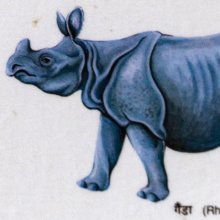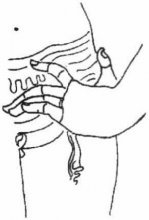Gada, Gadā, Gadam, Gadavane, Gadhavane: 46 definitions
Introduction:
Gada means something in Buddhism, Pali, Hinduism, Sanskrit, Marathi, Jainism, Prakrit, Hindi, biology. If you want to know the exact meaning, history, etymology or English translation of this term then check out the descriptions on this page. Add your comment or reference to a book if you want to contribute to this summary article.
Gada has 44 English definitions available.
Alternative spellings of this word include Gaad.
Images (photo gallery)
(+14 more images available)
Languages of India and abroad
Sanskrit dictionary
[Deutsch Wörterbuch]
Source: Cologne Digital Sanskrit Dictionaries: Böhtlingk and Roth Grosses Petersburger WörterbuchGaḍa (गड):—m.
1) eine Art Goldforelle [Hemacandra’s Anekārthasaṃgraha 2, 115.] [Medinīkoṣa ḍ. 9.] Vgl. gaḍaka . —
2) Hülle, Schirm (vyavadhāna); vgl. gaḍ . —
3) Graben [Śabdaratnāvalī im Śabdakalpadruma] —
4) Hinderniss [Hemacandra’s Anekārthasaṃgraha] [Medinīkoṣa] —
5) Nomen proprium einer Gegend [Rājanirghaṇṭa] u. d. W. gaḍalavaṇa, [Śabdakalpadruma]
--- OR ---
Gada (गद):—1. (von 1. gad) m. Rede, Spruch: mantrairgadairviṣaharai rakṣyamāṇaṃ samantataḥ [Mahābhārata 1, 1787.] — Vgl. avijñātagada .
--- OR ---
Gada (गद):—2.
1) m. Krankheit [Amarakoṣa 2, 6, 2, 2.] [Trikāṇḍaśeṣa 3, 3, 206.] [Hemacandra’s Abhidhānacintāmaṇi 463.] [Anekārthasaṃgraha 2, 225.] [Medinīkoṣa d. 4.] [Suśruta 1, 11, 3. fg.] [42, 21. 93, 7. 131, 3. 161, 3.] yeṣāṃ gadānāṃ ye yogāḥ pravakṣyante gadaṃkarāḥ [373, 17. 2, 309, 17.] [Raghuvaṃśa 9, 4. 17, 81.] sarvaṃ gadaṃ hanti yā [Śṛṅgāratilaka 14.] mūḍhacakṣurgadacchettar [Scholiast] in der Einl. zu [Jaimini] —
2) n. Gift [Rājanirghaṇṭa im Śabdakalpadruma] — Vgl. agada .
--- OR ---
Gada (गद):—3. m. Nomen proprium eines Sohnes von Vasudeva, eines jüngern Bruders von Kṛṣṇa [Trikāṇḍaśeṣa 3, 3, 206.] [Hemacandra’s Anekārthasaṃgraha 2, 225.] [Medinīkoṣa d. 4.] [Mahābhārata 1, 7992. 2, 1275. 3, 736. 8444.] [Harivaṃśa 1956. 5091. 6626. 8011. 8057. 8095. 8664. 8692. 8779. 9192.] [Viṣṇupurāṇa 439.] [Bhāgavatapurāṇa 1, 14, 28. 9, 24, 45. 51] (zwei Söhne von verschiedenen Müttern). — Vgl. gadāgraja und gādi .
--- OR ---
Gadā (गदा):—f.
1) Keule [Trikāṇḍaśeṣa 3, 3, 206.] [Hemacandra’s Abhidhānacintāmaṇi 222.] [Anekārthasaṃgraha 2, 225.] [Medinīkoṣa d. 4.] [Mahābhārata 1, 8200. 2, 762. 3, 14249.] [Duaupadīpramātha 5, 20.] [Sundopasundopākhyāna 2, 3. 4, 17.] [Rāmāyaṇa 5, 80, 4.] [Varāhamihira’s Bṛhajjātaka 58, 33. 69, 17.] gadāyuddhaparvan oder gadāparvan [Mahābhārata 9, Adhy. 33. fgg.] [Weber’s Verzeichniss No. 389. 397. 419.] [Weber’s Indische Studien 2, 137. fg.] —
2) Bignonia suaveolens [Śabdacandrikā im Śabdakalpadruma] —
3) eine best. Constellation: dviranantarakendrasthairgadā (Sch.: anantarayoḥ kendrayoryadā sarve grahā bhavanti . tadā gadā nāma yogo bhavati) [LAGHUJ. 10, 3.] [BṚH.] [J. 12, 4. 13.]
--- OR ---
Gaḍa (गड):—vgl. tṛṇa, payo; gaḍaka vgl. paṅka .
--- OR ---
Gada (गद):—1. , [Nīlakaṇṭha] : gadaiḥ daṃśasthāne kṣureṇotkīrṇe mardyamānairauṣadhaviśeṣaiḥ. gadā f. Spruch [WEBER, Rāmatāpanīya Upaniṣad 350.]
Source: Cologne Digital Sanskrit Dictionaries: Sanskrit-Wörterbuch in kürzerer FassungGaḍa (गड):——
1) *m. — a) eine Art Goldforelle. — b) Verhüllung , Decke. — c) Graben. — d) Hinderniss. — e) Nomen proprium einer Oertlichkeit. —
2) f. ā eine best. Rāgiṇī [Saṃgitasārasaṃgraha 55.]
--- OR ---
Gada (गद):—1. m. f. ( ā) Spruch. Vgl. auch gadā.
--- OR ---
Gada (गद):—2. —
1) m. Krankheit. —
2) *n. Gift.
--- OR ---
Gada (गद):—3. m. Nomen proprium verschiedener Söhne des Vasudeva Vp.2.
--- OR ---
Gadā (गदा):—f. —
1) Keule. —
2) *Bignonia suaveolens. —
3) ein best. Saiteninstrument [Saṃgitasārasaṃgraha 185.] —
4) eine best. Constellation. —
5) v.l. für gadhā [Taittirīyasaṃhitā] Comm. [2,507.]
Sanskrit, also spelled संस्कृतम् (saṃskṛtam), is an ancient language of India commonly seen as the grandmother of the Indo-European language family (even English!). Closely allied with Prakrit and Pali, Sanskrit is more exhaustive in both grammar and terms and has the most extensive collection of literature in the world, greatly surpassing its sister-languages Greek and Latin.
See also (Relevant definitions)
Starts with (+228): Gada hallae, Gada-Kana-Kara, Gadaba, Gadabada, Gadabadagunda, Gadabadam, Gadabadana, Gadabadanem, Gadabadata, Gadabadaunu, Gadabadavinem, Gadabadayaunu, Gadabade, Gadabadi, Gadabadike, Gadabadinu, Gadabadisu, Gadabadya, Gadabani, Gadabare.
Ends with (+350): Abhinavagada, Abhinivvagada, Adasangada, Agada, Agadabagada, Agadadhagada, Agadadigada, Agadatagada, Agadavigada, Agagada, Aggada, Aginagada, Akamugada, Akshigada, Alagada, Alargada, Amalgada, Amcekagada, Amgada, Amgadakhamgada.
Full-text (+339): Gaya, Gadagraja, Gadagada, Gadalavana, Gadambara, Gadadhara, Mahagada, Gadottha, Gadabhrit, Gadadeshaja, Gadakhya, Nigada, Agada, Adigadadhara, Gadahva, Gadarati, Gadin, Paribhavin, Gadaka, Jvalakharagada.
Relevant text
Search found 81 books and stories containing Gada, Gadā, Gaḍa, Gāḍā, Gādā, Gaḍā, Gāda, Gadam, Gaḍaṃ, Gaḍam, Gadavane, Gaḍāvaṇe, Gadhavane, Gaḍhāvaṇe, Gāḍa; (plurals include: Gadas, Gadās, Gaḍas, Gāḍās, Gādās, Gaḍās, Gādas, Gadams, Gaḍaṃs, Gaḍams, Gadavanes, Gaḍāvaṇes, Gadhavanes, Gaḍhāvaṇes, Gāḍas). You can also click to the full overview containing English textual excerpts. Below are direct links for the most relevant articles:
Garga Samhita (English) (by Danavir Goswami)
Verse 6.6.30 < [Chapter 6 - The Yādavas’ Victory When Śrī Rukmiṇī is Kidnapped]
Verse 6.6.32 < [Chapter 6 - The Yādavas’ Victory When Śrī Rukmiṇī is Kidnapped]
Verse 4.14.23 < [Chapter 14 - The Story of the Jālandharīs]
Bhakti-rasamrta-sindhu (by Śrīla Rūpa Gosvāmī)
Verse 3.2.157 < [Part 2 - Affection and Service (dāsya-rasa)]
Verse 3.3.24 < [Part 3 - Fraternal Devotion (sakhya-rasa)]
Verse 3.2.148 < [Part 2 - Affection and Service (dāsya-rasa)]
Lord Hayagriva in Sanskrit Literature (by Anindita Adhikari)
Iconographical descriptions of Hayagrīva in different Purāṇas < [Chapter 4]
Worship (with and without form of image) < [Chapter 6]
Brihad Bhagavatamrita (commentary) (by Śrī Śrīmad Bhaktivedānta Nārāyana Gosvāmī Mahārāja)
Verse 2.1.28 < [Chapter 1 - Vairāgya (renunciation)]
Verse 2.1.73 < [Chapter 1 - Vairāgya (renunciation)]
Verse 1.3.85 < [Chapter 3 - Prapañcātīta (beyond the Material Plane)]
Taliesin (by David William Nash)
Chaitanya Bhagavata (by Bhumipati Dāsa)
Verse 1.11.25 < [Chapter 11 - Meeting with Śrī Īśvara Purī]
Verse 2.14.17 < [Chapter 14 - Yamarāja’s Saṅkīrtana]
Verse 1.12.68 < [Chapter 12 - The Lord’s Wandering Throughout Navadvīpa]
Related products







